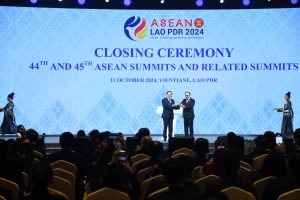As Malaysia takes on the chairmanship of the Association of Southeast Asian Nations (ASEAN) for 2025, Prime Minister Anwar Ibrahim faces a critical choice. For years, Muslim minorities in Myanmar have suffered relentless persecution under a brutal military regime. Malaysia has long been one of the most vocal ASEAN members on this issue, particularly during the Rohingya genocide of 2017, when it condemned the Myanmar military’s actions and called for stronger international responses. As a Muslim from Myanmar, I know all too well the pain inflicted by this junta on people of my faith. Malaysia now has a chance to champion the rights of Myanmar’s Muslim communities by steering ASEAN toward an approach grounded in accountability and justice for all.
This crisis goes beyond Myanmar’s borders; it affects the entire region. Since the 2021 coup, the junta has unleashed a brutal campaign targeting ethnic and religious minorities, displacing more than 3.3 million people and leaving more than 5,000 civilians dead. Over half the population now lives below the poverty line, a consequence of the junta’s widespread violence and economic mismanagement.
Yet ASEAN’s continued reliance on the Five-Point Consensus has failed to deliver results. The Consensus, agreed upon in April 2021, was intended to address the crisis by calling for an end to violence, inclusive dialogue, and humanitarian assistance, but it has been largely ignored by the junta. The Myanmar people have denounced it, and the junta has actively undermined it.
At the 44th and 45th ASEAN Summits, which were held in Vientiane earlier this month, Myanmar civil society organizations once again called for ASEAN to abandon this dead-on-arrival approach and to stand with the people of Myanmar in their efforts to build a federal democracy. As my organization, Burma Human Rights Network, highlighted in October 2022, the Five-Point Consensus has not only failed to curb the violence. It has instead emboldened the junta to intensify its atrocities against Myanmar’s people. ASEAN’s inaction and its decision to continue relying on the Five-Point Consensus has emboldened it further still.
ASEAN has repeatedly failed to protect Muslim minorities or take a decisive stand against the junta. The fractured approach has also allowed it to strengthen its grip on power, and continue to wage war on Myanmar’s diverse communities. Malaysia now has the opportunity to lead ASEAN in breaking this cycle by embracing a principled stance that rejects the junta’s legitimacy and supports the rights of Muslim minorities. Given Malaysia’s previous leadership on the Rohingya issue, it is in a strong position to rally other ASEAN members toward a more assertive approach.
First and foremost, ASEAN must cease all engagement with the military regime. Economic ties that benefit the junta, such as the flow of aviation fuel that enables airstrikes on civilian areas, must be cut. The junta should no longer be welcomed at ASEAN meetings; its representatives should be completely barred from all of ASEAN’s platforms. Malaysia should champion formal recognition of the National Unity Government (NUG) and state-level government structures that truly represent the people of Myanmar. ASEAN’s continued normalization of engagement with the junta contradicts its own commitments and undermines the legitimate democratic forces of Myanmar, including the NUG. Malaysia must seize this moment to push for a decisive break with this failed approach.
Second, ASEAN’s approach to humanitarian aid also needs a complete overhaul. Malaysia can lead the charge by ensuring aid reaches those who need it most through trusted ethnic and local networks rather than through a regime that has weaponized aid to oppress vulnerable populations. ASEAN must ensure that these local networks are equipped and empowered to deliver aid effectively, which will require Malaysia to help establish and strengthen partnerships with ethnic organizations and the NUG.
Myanmar civil society groups have urged ASEAN to end the involvement of the AHA Center, which currently facilitates the distribution of humanitarian aid through the junta’s channels. Instead, ASEAN must work directly with revolutionary groups and civil society organizations to ensure aid reaches communities in need. Working with the NUG and ethnic humanitarian groups will ensure that aid flows through channels free from the junta’s control, empowering communities that have long been marginalized.
Some may argue that isolating the junta will not bring about change. But appeasement has done nothing but embolden a regime that shows no regard for human rights. Continued engagement only prolongs the suffering of Myanmar’s people. Cutting ties won’t solve every problem, but it will send a clear message that ASEAN stands for justice and accountability.
Finally, instead of legitimizing the military junta, governments in ASEAN and Malaysia should push for accountability for the junta’s crimes. This could include continued support for the Independent Investigative Mechanism for Myanmar, the International Criminal Court, and ongoing Universal Jurisdiction cases. These efforts could bring the military’s crimes to light, providing a pathway to justice for those affected.
As Malaysia assumes the ASEAN chair, it faces a critical choice: to continue a path of ineffective diplomacy or to take bold action for justice and human rights. Myanmar civil society has made it clear that ASEAN’s current approach is actively harming the people of Myanmar by lending legitimacy to the junta. Myanmar’s Muslim minorities and all oppressed communities need ASEAN to stand up and make a stand. Malaysia has the opportunity to be a catalyst for real change, ensuring that ASEAN stands on the right side of history.

































